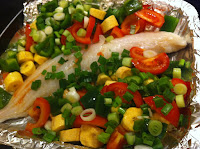I'm calling the dish I made Peixe Assado com Farofa, which sounds a lot better than 'Baked Fish with crumbs', which is the English-language translation! Farofa is a very traditional Brazilian side, made from Cassava flour. I imagine that the people of the Amazon would eat their farofa with Pirarucu (also known as Arapaima) but again, being London-based, I settled for a nice piece of cod. Whilst it would have been great to taste a real Pirarucu, it's not an ethical option (not to mention the cost). The Brazilian government has banned commercial fishing of Pirarucu, due to it's vulnerable conservation status, so I don't expect to see this Amazonian monster on supermarket shelves in the UK any time soon.
 |
| Ingredients for Farofa |
For the Farofa:
Chilli oil - óleo de pimenta
150g butter - manteiga
1 onion - cebola
1 red chilli - pimentão vermelho
200g Cassava (manioc) flour - farinha de mandioca
For the Baked Fish:
500g cod fillet - filetes de bacalhau
1 bell pepper - pimentão
2 spring onions - cebolinhas
3 plantains - bananas-de-terra
3 tomatoes - tomates
raisins - passas de uva
prunes - passas de ameixa
black olives - azeitonas pretas
3 eggs - ovos
Fresh coriander - coentro fresco
Preparing the Farofa
I did this bit last, but when I make this dish next time, I'll prepare the farofa first, which will give it a chance to cool down. I started by heating some chilli oil in a frying pan. Once the oil was hot, I added loads of butter - farofa can be quite dry, so it's good to add lots of butter (not to mention that butter is one of my main vices!). Almost immediately afterwards, I added the chopped onion and chilli, frying these for a few minutes to let them soften. Finally I added the Cassava flour and stirred this into the mixture until it formed a crumb-like mixture - I continued to fry the mixture for a few minutes before transferring it to a plastic bowl.
 |
| Heat the oil and melt the butter |
 |
| Add the chopped onion and chilli |
 |
| Fry until the onion softens |
 |
| Add the flour and mix to get crumbs |
This is the third time that I've cooked with cassava/manioc (see my earlier blogposts on West African Fufu and Paraguayan Payagua Mascada). I'm not sure that I'll ever get used to the 'woody' taste of cassava and it's amazing to think that this root is eaten by millions of people around the world every day! I didn't quite realise that farofa is often crumbled over the top of a dish to give it a distinctive woody taste. In retrospect, I might have preferred this to the patties that I made out of the farofa (no doubt I've been influenced by having made Payagua Mascada and Fufu).
Preparing the fish
This bit was easy although, rather surprisingly, I realised that I've never baked fish before! For anyone reading this blog for the first time, I'd like to reiterate that this post is in no way meant to be a professional guide to baking fish or preparing farofa!
 |
| Prepare the fish |
 |
| Add the chopped vegetables |
I pre-heated the oven at 180 degrees celsius, put my cod fillet into a metal container layered with tin foil and olive oil, to prevent the baked fish from sticking to the tin. I then added the sliced peppers, spring onions, plantain and tomatoes and baked these in the oven for 30 minutes.
After 30 minutes, I took the dish out of the oven and added the olives, raisins, prunes and coriander. I could have added the raisins and prunes to the farofa, instead of the main dish and this is something I'll consider next time round.
 |
| Add the olives, raisins and prunes |
I baked the fish and vegetables for another 15 minutes before adding the cassava patties and topping with three fried eggs. I then covered the whole dish with tinfoil and put it back in the oven for 10 minutes on a much lower temperature (120 degrees and then 0).
I impressed myself with the results and I'm really pleased that I learned how to make farofa and bake fish!
 |
| Top with fried eggs and farofa |
 |
| Plate up! |
Sources:
All photos are by me - please feel free to reuse these using the Creative Commons license:
Attribution (especially to this blog)
Share-alike
Non-commercial
I looked at a variety of sources which influenced the way that I made this dish. The most important of these was the following Youtube video from Cucabaruca.com (Nando Cuca), which taught me how to make farofa. Enjoy!


No comments:
Post a Comment